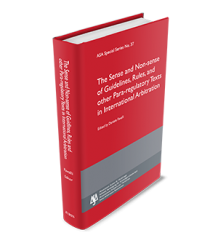Sense and Non-sense of Guidelines, Rules and Other Para-regulatory Texts in International Arbitration - ASA Special Series No. 37

There is a great number of arbitration rules applicable to various forms of proceedings with or without the support of institutions. The rules intended to govern international arbitration are revised in regular intervals and, despite the growing number of institutions, seem to resemble each other increasingly.
Beside this body of rules, which form the regulatory core of international arbitration, there are other texts, described as “guidelines”, “notes” or similar expressions, which propose to provide guidance, information, advice and directives to parties, arbitrators and institutions. Since these texts differ from the rules governing the arbitration proceedings as a whole, it is proposed to refer to them as “para-regulatory texts”.
The number of institutions, associations and other groups of varying qualifications which issue such texts is continuously growing; so are the subject matters with which they deal and the number of texts produced. While the relevance, authority and usefulness varies from one text to another, taken together they form a thicket of continuously growing density.
Occasionally one or the other of these texts has given rise to controversies or a critical analysis. But no systematic analysis of the phenomenon as such and its impact on the practice of international arbitration seems to have been undertaken yet. This volume of the ASA Special Series starts a discussion about these para-regulatory texts, examining the phenomenon in general and by reference to some of them specifically.
The discussion in this volume focuses on a more general manner on the status of these texts, in particular:
The authority of para-regulatory texts in arbitration practice;
The frequency with which they are referred to or used;
The authors of these texts, their mandate, qualification and experience;
The areas covered by such texts and those which have not or less prominently been addressed.
The Sense and Non-sense of Para-regulatory Texts in International Arbitration will provide some insight in the effect which para-regulatory texts have on arbitration practice, on the responsiveness of arbitration to the needs of its users and on the further development of arbitration. Is the trend to be discouraged or to be further developed? What directions should it take?
PDF of Title Page and T.O.C.
Daniele Favalli is with the Zurich based VISCHER law firm. Upon completion of his post graduate law studies at the University of Austin at Texas in the year 2000, he practiced in the field of international arbitration in the U.S. and Latin America with Steel Hector & Davis LLP (now Squire Sander & Dempsey) in Miami until 2005. In addition, Daniele Favalli teaches international arbitration at the University of Lucerne, Switzerland, and is a founding member of the Swiss Arbitration Academy.
Daniele Favalli is with the Zurich based VISCHER law firm. Upon completion of his post graduate law studies at the University of Austin at Texas in the year 2000, he practiced in the field of international arbitration in the U.S. and Latin America with Steel Hector & Davis LLP (now Squire Sander & Dempsey) in Miami until 2005. In addition, Daniele Favalli teaches international arbitration at the University of Lucerne, Switzerland, and is a founding member of the Swiss Arbitration Academy.
